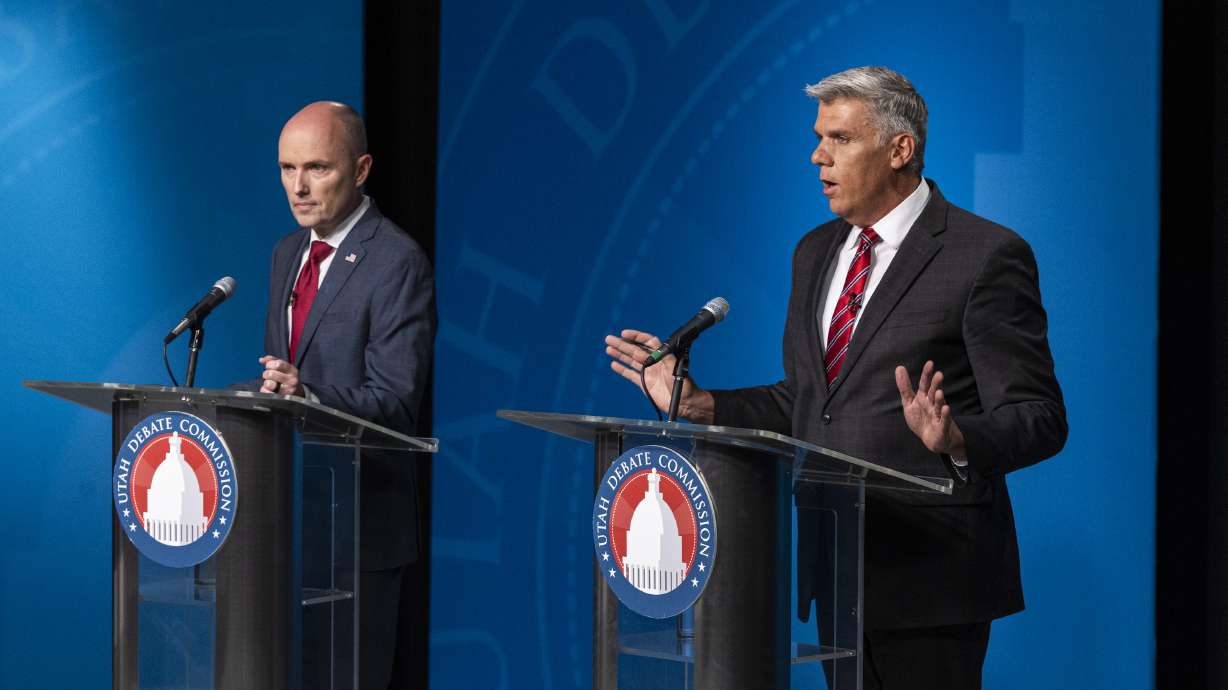Estimated read time: 5-6 minutes
This archived news story is available only for your personal, non-commercial use. Information in the story may be outdated or superseded by additional information. Reading or replaying the story in its archived form does not constitute a republication of the story.
SALT LAKE CITY — Utah Gov. Spencer Cox and state Rep. Phil Lyman, a Republican gubernatorial challenger, presented differing views on state involvement in fixing the affordable housing crisis and on future Olympic Games in the state during a primary debate in Salt Lake City Tuesday evening.
Though Lyman has developed a reputation as a firebrand on social media and has constantly attacked Cox throughout the campaign, the hourlong discussion was largely focused on policy — something each candidate commented on after the fact, with Lyman describing it as "a little bit tame" and Cox saying it was "unbelievably boring."
But both implied that was a good thing as they were able to focus on issues. The two were mostly aligned on a majority of issues, from public lands to the question of whether the state should eliminate the state income tax — both said "yes" to the latter.
Olympics and stadiums
One of the biggest differences came early on in the debate, when they were asked what the state's financial responsibility should be for a potential 2034 Winter Olympic Games.
"This is the easiest question we'll get all night," Cox said. "Utah's financial responsibility should be zero, and it will be zero."
The governor went on to tout the Games as an "incredible opportunity for our state," and said the cost will be carried by advertisers and sponsorships: "It's not going to cost the taxpayers a single penny, and we should be proud of that."
Lyman, on the other hand, was less enthused by the return of the Olympics, saying the 2002 Games presented an "elite economy," where "a few get to participate, and the rest get to be spectators." He said the Games would create a "tremendous cost" to the state and said, "If you took a poll, people wouldn't be excited."
Cox was quick to point out that a poll had been conducted, pointing to a Deseret News poll published Tuesday morning showing that 79% of Utahns strongly or somewhat support the state hosting the Games.
Lyman said he hadn't seen the poll and appeared to dismiss the results, saying his "response is based on talking to people on the street." The representative was similarly dismissive of a bill that allows Salt Lake City to raise taxes to create a downtown revitalization zone that could include a new basketball and hockey arena, calling it "an ongoing liability to the taxpayers."
The governor has long been supportive of that bill and noted that those outside of the capital "will not pay a dime."
"I believe this is the very best way to protect taxpayers," he said.
Affordable housing
The candidates also took different tacts when it comes to increasing the supply of affordable housing stock and tackling rising real estate prices. Cox made building 35,000 starter homes in the state a key policy focus ahead of this year's legislative session, and lawmakers approved a $300 million fund to provide low-interest loans to developments where at least 60% of the homes are considered affordable.
He called the issue the "single most important" problem facing the state. When asked how he would make housing affordable, he pointed to what he has already done.
"We have to build 35,000 starter homes in this state," he said. "We have to make sure that our kids can own real property again; that is the American dream."
But Lyman said the idea that the state can help dig out of the housing deficit is just a "comforting myth that we like to tell ourselves."
"The truth is that free market principles are going to fix this problem," he said, adding that the state should lower "regulation cost" and change what he said is an incentive to build high density housing.
State of the race
Cox, a popular incumbent governor, entered the night with a commanding lead over the Blanding representative, according to a recent poll from the Deseret News and the University of Utah Hinckley Institute of Politics. Lyman has also been pushing back against an independent investigation after state employees said he mockingly mimicked female staff, called employees "idiots" and used the f-word at a meeting in January.
The investigation concluded Lyman did not violate state law or legislative policies but said his conduct was "unprofessional and inappropriate," and appeared to be "an isolated incident."
"There was no shouting. I didn't call anybody an idiot," Lyman told the Deseret News. He also said he didn't use the expletive toward the employees and that he was referring to a land swap related to the Bears Ears National Monument.
Lyman handily defeated Cox at the state GOP nominating convention in April, though Cox qualified for the primary by collecting signatures. Cox's apparent strength in the race has raised additional questions about whether the convention delegates are out of step with the Republican electorate in Utah at large.
Tuesday's debate was one of the last opportunities for each candidate to stand out, given that ballots were mailed a week ago.
It was the fifth of six primary debates hosted by the nonpartisan Utah Debate Commission this cycle. Republican candidates for Utah's U.S. Senate seat and 1st and 2nd Congressional Districts debated across three debates Monday, and GOP contenders for the statewide office of attorney general debated Tuesday afternoon.
The five Republicans running for Utah's 3rd Congressional District seat will take the stage Wednesday at 6 p.m. All debates are held at PBS Utah in the Eccles Broadcast Center on the University of Utah campus.










